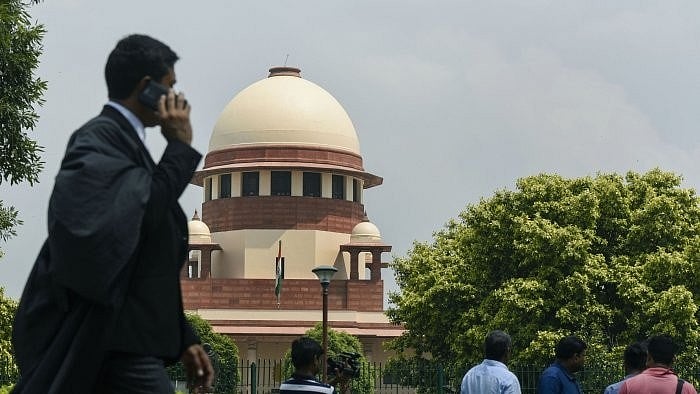
Supreme Court.
Credit: PTI Photo
The Supreme Court has set free a man from Tamil Nadu of the charges of killing his own wife, finding "serious doubt" about prosecution's claim of extra judicial confession made before a village administrative officer.
"Extra judicial confession is always a weak piece of evidence," a bench of Justices Abhay S Oka and Sanjay Karol said, while setting aside the Madras High Court's judgement which had upheld the trial court's order, which convicted appellant Moorthy under Section 302 and 201 of the IPC and awarded him life imprisonment.
The bench noted the accused had allegedly confided in to the village officer about the killing, more than two months as the incident is of May 29, 2006 but the alleged extra judicial confession was made on August 10, 2006.
"It is impossible to understand why would the appellant meet the Village Administrative Officer, who was a total stranger to him, more than two months after the incident for making a confession," the bench said.
The court also pointed out the officer and the appellant were not known to each other till August 10, 2006.
"Normally an accused will confide only with a person in whom he has implicit faith. He would not go to a stranger to make a confession of guilt. The fact that the alleged confession was made by him more than two months after the incident makes it more suspicious," the bench said.
The court also picked holes in the prosecution's claim with regard to recovery of the alleged murder weapon, stick, and the body of the deceased in view of contradictions in version of prosecution witnesses.
"There is serious doubt about the genuineness of the prosecution case regarding the recovery of a dead body at the instance of the appellant and the recovery of the alleged instrument of the offence at the instance of the appellant," the bench said.
The court said most importantly, it is not possible to accept the case of the prosecution which is entirely based on the extra judicial confession made by the appellant.
"Thus, there was no legal evidence on record to convict the appellant. In any case, the guilt of the appellant has not been proved beyond a reasonable doubt," the bench added.
The prosecution claimed the appellant suspected that his wife Shanthi had illicit intimacy with one person. On May 29, 2006 at about 9:00 pm, he took the deceased to the bank of Ponnai River and assaulted her with a stick. Shanthi succumbed to the injuries. He buried the dead body over there.
It relied upon the extra judicial confession made by the appellant before Ganesan Perumal in the presence of Tyagarajan Kannan. It also claimed the recovery of the dead body and the stick allegedly used as a weapon of assault at the instance of the appellant.
